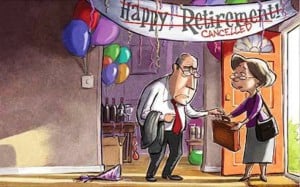There are many reasons why Canadians are struggling with debt and ultimately not avoiding bankruptcy. However it is widely agreed upon that lower interest rates have encouraged us to purchase big ticket items like cars and houses. The good news is that according to a CIBC report, personal bankruptcies have returned to pre-recession levels, to four insolvencies per 1,000 adults, from an all-time high reached during the recession of six per 1,000. However, that doesn’t really tell the story because the number of Canadians striking consumer proposals has grown to 40% of total insolvency cases, from about 15% in 2006 – an increase that underscores a major shift in how consumers are avoiding the full bankruptcy route. In fact consumer proposals now make up 50% of total insolvencies in Ontario.
According to the Office of the Superintendent of Bankruptcy (OSB) here are the top 10 reasons that Canadians go bankrupt:
- Overextension of Credit: 22%
- Seasonal Employment: 15%
- Job Loss: 12.8%
- Medical Problems: 11.3%
- Relationship Breakdown: 10.3%
- Money Mismanagement: 9.2%
- Failed Business: 9.1%
- Failure to Pay Taxes: 3.6%
- Gambling Addiction: 2%
- Inadequate Pension: 1.4%
The Bank of Canada’s Review of Household Insolvency in Canada (Winter 2011 – 2012) reports that the largest unsecured liabilities are credit card debt and bank loans.
LIABILITY TYPE – BANKRUPTCY/ RENTER | PERCENTAGE |
| Individuals/Doctors/Lawyers/Gov. | 24.71 |
| Credit Cards (bank/trust co. issuers) | 18.99 |
| Bank Loans (except mortgages) | 17.26 |
| Taxes | 16.59 |
| Credit Cards (other issuers) | 8.19 |
| Finance Co. Loans | 7.92 |
| Real Property Mortgages | 3.28 |
| Student Loans | 2.83 |
| Payday Loans | 0.23 |
| LIABILITY TYPE – BANKRUPTCY OWNER | PERCENTAGE |
| Real Property Mortgages | 56.55 |
| Individuals/Doctors/Lawyers/Gov. | 13.52 |
| Bank Loans (except mortgages) | 11.26 |
| Credit Cards (bank/trust co. issuers) | 6.29 |
| Finance Co. Loans | 4.52 |
| Taxes | 4.34 |
| Credit Cards (other issuers) | 3.10 |
| Student Loans | 0.31 |
| Payday Loans | 0.11 |
Many Canadians are dealing with serious debt issues. Whether you decide to declare bankruptcy or opt for a bankruptcy alternative – Credit Counselling, Debt Consolidation, Consumer Proposals – you need the help of a professional trustee. Contact Ira Smith Trustee & Receiver Inc. as soon as possible for advice and a plan to tackle your financial difficulties. Starting Over, Starting Now you can live a debt free life.








